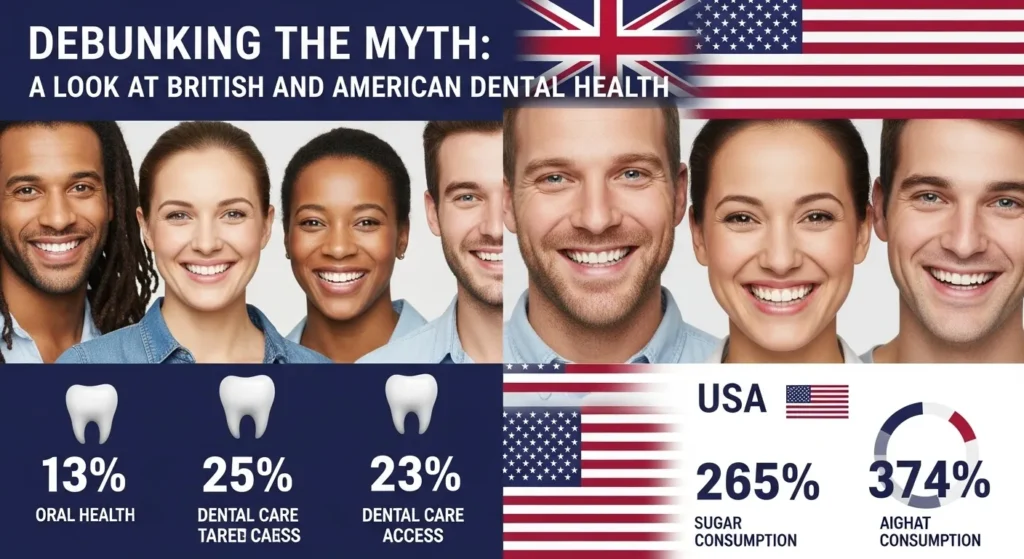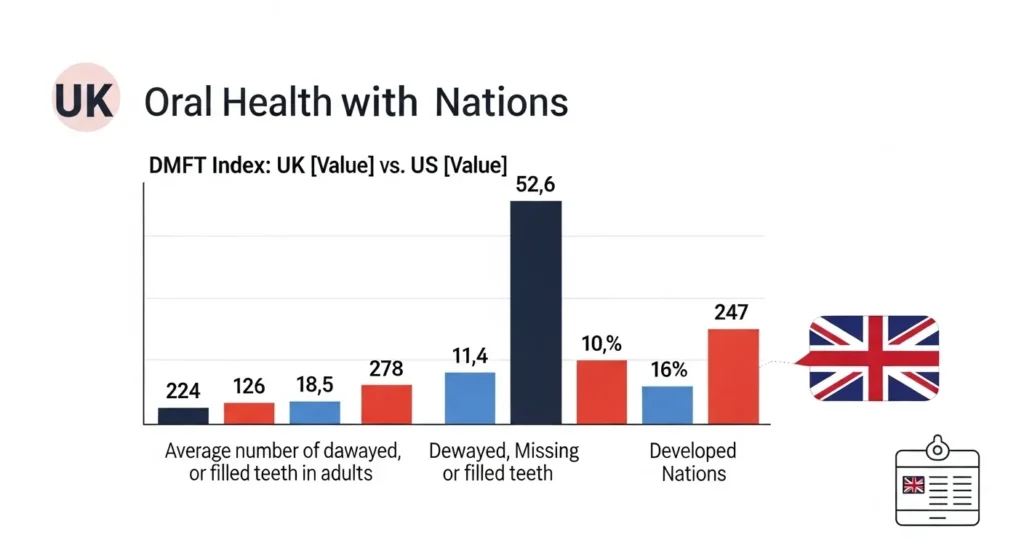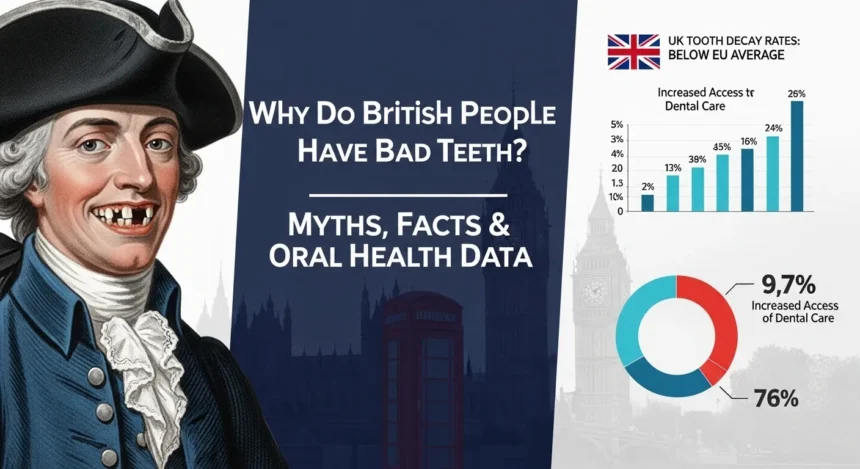Table of Contents
I often hear people joke about British smiles, and the phrase “why do british people have bad teeth” still shows up in conversations, films, and memes. But is this really true, or is it just a cultural stereotype that refuses to die? We can explore where this idea started, what the numbers actually say, and how cultural differences between the UK and the US shape the conversation.
Where the Stereotype Began

They say the stereotype goes back to the 1930s, when Hollywood actors dazzled with perfect “movie star” smiles. American films exported that image worldwide, setting the standard for what “good teeth” should look like.
We know that in contrast, Brits often valued character and natural beauty over cosmetic perfection. A slightly crooked smile was not seen as a flaw but as a feature that made a face unique.
British vs American Oral Health Data
I looked at the actual dental health numbers, and they tell a different story than the stereotype suggests.
- In 2008, the UK’s average DFMT index (decayed, missing, or filled teeth) for 12-year-olds was 0.7, the best score in Europe.
- The US reported 1.3 in 2004 for the same age group.
- For adults, Brits averaged 6.97 missing teeth compared with 7.31 for Americans, according to a Harvard study.
- Today, only 6% of Brits have no natural teeth left, a huge drop from nearly 30% in 1978.
These numbers prove oral health in the UK is not worse than in the US—in some areas, it is actually better.
Dental Visits and Habits
We sometimes assume Brits avoid dentists, but the evidence suggests otherwise.
- In 2012, 7 in 10 Britons visited a dentist, while only 4 in 10 Americans did.
- The UK ranked third out of 16 countries for dental visits, while the US ranked 13th.
- By 2020, about 21% of Brits had not visited a dentist in two years, and 19% admitted to not brushing twice daily.
Still, brushing habits aren’t perfect:
- 6% of men go more than a week without brushing.
- 60% of women skip brushing before bed.
- 11% of adults skip brushing before work.
Fluoride, Class, and Regional Gaps

They highlight another issue: the difference in access. In the US, 170 million people have fluoridated water, compared to just 10% of the UK population.
Regional gaps also tell a story: only 2% of three-year-olds in wealthy South Gloucestershire have decay, but in Leicester, a less affluent area, that figure is 34%.
Even among older adults, the richest 20% in the UK keep eight more teeth than the poorest 20%.
Cosmetic Standards: UK vs US
We need to remember the biggest difference is not health but looks. Americans often see dental care as part of personal grooming, the same as a haircut.
- In the US, about 14% of people have had teeth whitening, compared to just 3% in the UK.
- Cosmetic spending in the UK rose to £1.86bn in recent years, but that’s still far below US levels.
- Orthodontic treatments are common in both countries, with one million people in the UK starting them in 2012, but braces in the US can cost thousands.
Brits generally prefer a natural smile, while Americans lean toward the bright-white, uniform “Hollywood smile.”
The NHS and Cultural Perceptions
We often forget the role of healthcare systems. In the UK, children can get free orthodontic care through the NHS if needed. In the US, families must often pay $2,770–$4,324 for surgical implant work, or thousands for braces.
Because the NHS prioritizes medical necessity over cosmetic work, UK dentistry leans more toward health than appearance.
Why the Stereotype Persists
These jokes and images still stick because culture is powerful.
- In the US, white teeth are tied to success and professionalism. A London dentist shared how Brits visiting the US for business were told they wouldn’t be “taken seriously” without fixing their smiles.
- Media jokes—from P. J. O’Rourke’s 1988 book to sitcoms—keep the idea alive.
- Even today, some US dentists train in “natural British smiles,” proving that image differences shape expectations.
How Oral Health Connects to Overall Health

We cannot ignore how oral health links to broader health. Poor hygiene raises risks of heart disease, pneumonia, and diabetes complications. That’s why skipping visits or neglecting brushing is more than cosmetic—it’s about life-long well-being.
Final Thoughts
We now see the truth: British people do not actually have worse teeth than Americans. In fact, oral health statistics often favor the UK. What separates the two cultures is not health but beauty standards—Americans value bright, uniform smiles, while Brits lean toward natural appearances.
So next time someone jokes about “bad British teeth,” we should remind them the stereotype is outdated. Dental health has improved dramatically since the 1970s, and today the debate is more about style than substance.
FAQs
Why do people say British people have bad teeth?
The stereotype started in the 1930s with Hollywood’s “perfect smiles.” Brits valued natural looks, while Americans embraced cosmetic dentistry.
Do Brits actually have worse teeth than Americans?
No. Studies show UK oral health often equals or surpasses US levels, with fewer missing teeth and better decay rates among children.
How often do British people visit the dentist?
About 7 in 10 Brits visit the dentist regularly, a higher rate than Americans, who average 4 in 10.
Is fluoride a factor in dental health differences?
Yes. Around 170 million Americans have fluoridated water, while only 10% of Brits do, leading to regional gaps in decay rates.
Why don’t Brits focus on cosmetic dentistry?
Brits generally prefer natural smiles, while Americans view white, straight teeth as a beauty and success standard.
References
- Organisation for Economic Co-operation and Development (OECD). Oral Health Indicators and DFMT Data (2004, 2008).
- The Telegraph. “British Adults Have Fewer Missing Teeth Than Americans” – citing Harvard Study.
- National Smile Month Survey. UK Oral Health Habits (2013).
- British Dental Association (BDA). Improvements in UK Dental Health Since the 1970s.
- World Health Organization (WHO). Global Health Observatory: Obesity and Oral Health Statistics.
- NHS England. Dental Services and Orthodontic Care Provision.
- American Dental Association (ADA). Fluoridation and Oral Health Benefits in the US.
- O’Rourke, P. J. (1988). Holidays in Hell. Atlantic Monthly Press.
- Harvard School of Public Health. Oral Health and General Health Correlations.
- UK Government. Water Fluoridation and Regional Dental Health Inequalities (Public Health England).
Disclaimer: This article is for informational purposes only and not a substitute for professional dental advice. Always consult a qualified dentist for diagnosis, treatment, or oral health concerns.
About the Author:
Ben Cornette is a health and culture writer with a focus on oral health and public perception. He brings together research, history, and expert insights to debunk myths and explain how culture shapes the way we view dental care.








